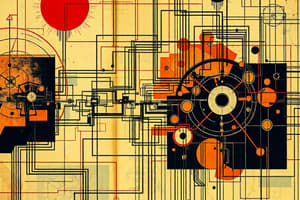Podcast
Questions and Answers
Who developed Kirchhoff's Laws?
Who developed Kirchhoff's Laws?
- Gustav Robert Kirchhoff (correct)
- Georg Ohm
- Michael Faraday
- James Clerk Maxwell
What does Kirchhoff's Voltage Law (KVL) state?
What does Kirchhoff's Voltage Law (KVL) state?
- The algebraic sum of the voltage across any closed loop is zero. (correct)
- The total current entering a junction is equal to the total current leaving.
- Voltage is constant throughout a circuit.
- Current cannot flow through an open circuit.
What is the key principle behind Kirchhoff's Current Law (KCL)?
What is the key principle behind Kirchhoff's Current Law (KCL)?
- Current entering a node equals current leaving the node. (correct)
- Charge can be lost in a node.
- Only one current can enter a node at a time.
- Currents can be negative.
In Kirchhoff's Current Law, how can the equation be expressed?
In Kirchhoff's Current Law, how can the equation be expressed?
What is the common application of Kirchhoff's Laws?
What is the common application of Kirchhoff's Laws?
When was Kirchhoff's Laws described?
When was Kirchhoff's Laws described?
What does the term 'Node' refer to in electrical circuits?
What does the term 'Node' refer to in electrical circuits?
What assumption is made in Kirchhoff's Laws about charge in a node?
What assumption is made in Kirchhoff's Laws about charge in a node?
Which of the following is part of the equation derived from KCL?
Which of the following is part of the equation derived from KCL?
Which laws can be derived from Maxwell's equations but were developed earlier?
Which laws can be derived from Maxwell's equations but were developed earlier?
Flashcards
Kirchhoff's Voltage Law (KVL)
Kirchhoff's Voltage Law (KVL)
The algebraic sum of voltages around any closed loop in a circuit is zero.
Kirchhoff's Current Law (KCL)
Kirchhoff's Current Law (KCL)
The total current entering a junction equals the total current leaving the junction.
Closed Loop
Closed Loop
A complete path in a circuit that starts and ends at the same point.
Junction/Node
Junction/Node
Signup and view all the flashcards
Algebraic Sum
Algebraic Sum
Signup and view all the flashcards
Conservation of Charge
Conservation of Charge
Signup and view all the flashcards
Electrical Circuit
Electrical Circuit
Signup and view all the flashcards
Current Entering
Current Entering
Signup and view all the flashcards
Current Leaving
Current Leaving
Signup and view all the flashcards
Kirchhoff's Laws
Kirchhoff's Laws
Signup and view all the flashcards
Study Notes
Kirchhoff's Laws
- Kirchhoff's Laws are fundamental to electrical engineering, described in 1845.
- These laws build upon the work of Georg Ohm.
- Maxwell's equations can also be used to derive the laws, but they were discovered before Maxwell's work.
Types of Kirchhoff's Laws
- KVL (Kirchhoff's Voltage Law): The algebraic sum of the voltages across any set of branches in a closed loop is zero. Mathematically, ΣVacross branches = 0.
- KCL (Kirchhoff's Current Law): The total current entering a junction or node equals the total current leaving. In other words, the algebraic sum of currents at a node is zero. Mathematically, Σ Ientering = Σ Ileaving or Σ Inode = 0.
Kirchhoff's Voltage Law (KVL)
- The algebraic sum of voltages around a closed loop is zero.
Kirchhoff's Current Law (KCL)
- Current entering a node equals current leaving that node.
- The algebraic sum of currents at any junction is zero.
Application of Kirchhoff's Laws
- To analyze a circuit, initially, assume all voltages and resistances are known.
- Assign a branch current to each branch.
- Find equations for each node according to KCL.
- Find equations for each independent loop according to KVL.
- Use simultaneous equations to determine unknown currents.
Conclusion
- Kirchhoff's Laws simplify circuit calculations, reducing the complexity of mathematical solutions.
Studying That Suits You
Use AI to generate personalized quizzes and flashcards to suit your learning preferences.




